
Politics of Bangladesh takes place in a framework of a parliamentary representative democratic republic, whereby the Prime Minister of Bangladesh is the head of government, and of a multi-party system. Executive power is exercised by the government. Legislative power is vested in both the government and parliament. The Constitution of Bangladesh was written in 1972, and has undergone seventeen amendments.
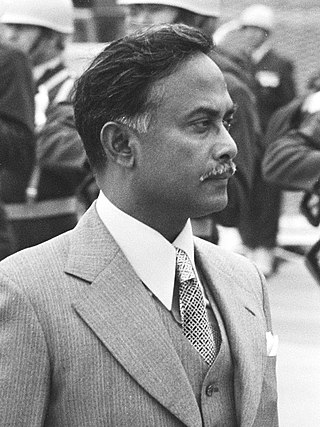
Ziaur RahmanBU HJ HOR was a Bangladeshi military officer, freedom fighter and politician who served as the sixth President of Bangladesh from 1977 until his assassination in 1981. He was the founder of the Bangladesh Nationalist Party (BNP). He previously served as the third chief of army staff from 1975 to 1978 with a minor break.

The Bangladesh Nationalist Party is a major political party in Bangladesh. Founded on 1 September 1978 by the late Bangladeshi president Ziaur Rahman, with a view to uniting people with a nationalist ideology, BNP later became one of the two dominant parties in Bangladesh, along with its archrival Awami League. Initially a big tent centrist party, it later moved towards more right-wing politics.
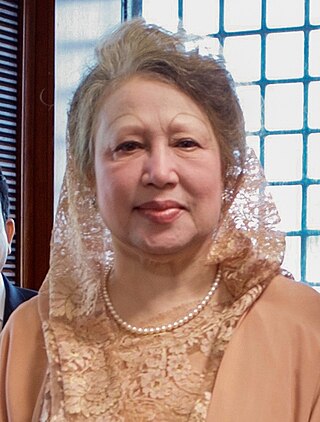
Begum Khaleda Zia is a Bangladeshi politician, who served as the prime minister of Bangladesh from March 1991 to March 1996, and again from June 2001 to October 2006. She was the first female prime minister of Bangladesh and second female prime minister in the Muslim world, after Benazir Bhutto. She is the widow of one of the former presidents of Bangladesh, Ziaur Rahman. She is the chairperson and leader of the Bangladesh Nationalist Party (BNP) since 1984, which was founded by her husband in 1978.
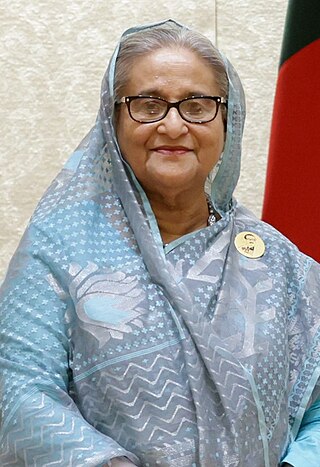
Sheikh Hasina Wazed is a Bangladeshi politician who served as the tenth prime minister of Bangladesh from June 1996 to July 2001 and again from January 2009 to August 2024. She is the daughter of Sheikh Mujibur Rahman, the founding father and first president of Bangladesh. Having served for a combined total of over 20 years, she is the longest serving prime minister in the history of Bangladesh. She was the world's longest-serving female head of government. Her authoritarian regime ended in self-imposed exile following a series of violent protests in 2024.

Hussain Muhammad Ershad was a Bangladeshi military officer and politician who served as the leader of Bangladesh from 1982 to 1990, ruling as an unelected military strongman from 1982 to 1983 and as president of Bangladesh from 1983 to 1990.

Moudud Ahmed was a Bangladeshi lawyer and politician. He was a standing committee member of Bangladesh Nationalist Party. Ahmed was elected as a Jatiya Sangsad member total five times from Noakhali-1 and Noakhali-5 constituencies.
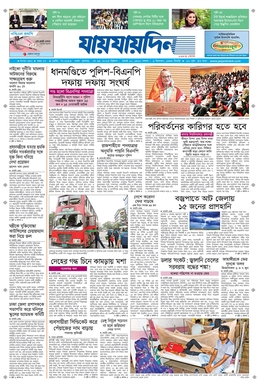
Jaijaidin is a Bengali-language daily newspaper published from Dhaka, Bangladesh.
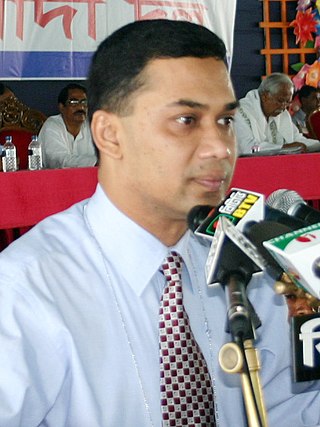
Tarique Rahman, also known as Tarique Zia, is a Bangladeshi politician and businessman, who is the acting chairman of Bangladesh Nationalist Party (BNP) since February 2018. He is the eldest son of former president Ziaur Rahman and former two-time prime minister Khaleda Zia. He is widely seen as a powerful figure in BNP and held several high-profile positions within the party, including the post of senior joint secretary general. In 2018, he was sentenced to life imprisonment for organizing the 2004 Dhaka grenade attack.

Sajeeb Ahmed Wazed, also known as Sajeeb Wazed Joy, is a Bangladeshi businessman and politician. He is a member of the Bangladesh Awami League and served as an advisor to Prime Minister Sheikh Hasina on information and communication technology affairs.

M Ilias Ali was a Bangladeshi politician and member of the Jatiya Sangsad (2001–2006) representing the Sylhet-2 constituency. He served as the organising secretary of the Bangladesh Nationalist Party. He, along with his personal car driver, Ansar Ali, went missing on 18 April 2012. Later that day, local police recovered his abandoned car near his residence in Banani neighborhood and found Ansar's cellphone inside. They have not been seen since. On the tenth anniversary of his disappearance, Netra News, an independent news platform in Sweden, reported on 21 April 2022, that Rapid Action Battalion (RAB), an elite Bangladeshi police unit, had carried out the disappearance. The platform cited leaked confidential documents and internal investigations documents from RAB to reach the conclusion.
Hawa Bhaban is the political office of the chairperson of the Bangladesh Nationalist Party, and monitors party affairs on the chair's behalf. It was viewed as an "alternate power house" in Bangladesh when BNP was in power from 2001 to 2006. It became controversial during the 2006–2008 Bangladeshi political crisis when the party joint secretary was Tarique Rahman, son and heir apparent of the chairperson of the Bangladesh Nationalist Party Khaleda Zia. Some government officials maintained regular contact with viya (Tareq) to manipulate administrative matters such as promotion, posting, appointment etc. in different ministries and divisions. This resulted in a parallel government being administered from Hawa Bhaban.

Bangladesh Jatiotabadi Chatra Dal, also known as JCD, is the affiliate student wing of the Bangladesh Nationalist Party (BNP). Many of the top BNP leaders and policy-makers today were once closely associated with JCD and developed as student leaders.
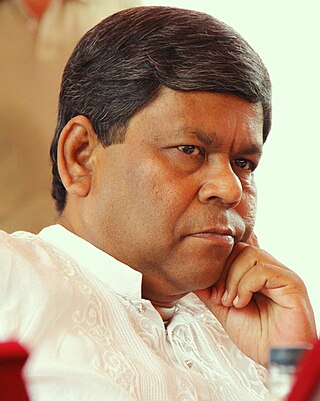
Shaukat Mahmood is a Bangladeshi journalist and politician.

Mohammad Mosaddak Ali, also known as Phalu, is a Bangladeshi entrepreneur and a politician who was a former parliamentarian from Bangladesh Nationalist Party (BNP). He served as the political secretary to the Prime Minister of Bangladesh Begum Khaleda Zia between 2001 and 2004. He was responsible for building special relations and partnership for development between the government and the private sector that is interested in investing in new and highly potential industrial sectors, and introducing new products and services to local industries, at a time when Bangladesh's economic growth accelerated. In 2003, Ali launched Bangladesh's first automation-based private satellite television station NTV. He also founded another satellite channel RTV and Bengali daily newspaper Amar Desh. He is the founding President of Association of Television Channel Owners (ATCO).

The 1990 Mass Uprising, popularly known as '90's Anti-Authoritarian Movement, was a democratic movement that took place on 4 December and led to the fall of General Hussain Muhammad Ershad in Bangladesh. The uprising was the result of a series of popular protests that started from 10 October 1990 to topple General Ershad who came to power in 1982 by imposing martial law and replaced a democratically elected President through a bloodless coup.

Nazmul Huda was a Bangladeshi barrister and politician. He served as the minister of information (1991–1996) and the minister of communications (2001–2006) of the government of Bangladesh. He was a four-term Jatiya Sangsad member representing the Dhaka-1 constituency. He was a member of Bangladesh Nationalist Party since its inception until 2012 when he left the party as its vice chairman.

The Suchinta Foundation is a Bangladeshi non-profit think tank and research centre. Mohammad A. Arafat is the chairperson of the foundation. Arafat is the former minister of state for information and broadcasting. He was a teacher of management at the Canadian University of Bangladesh. Rubel Ahsan is the vice-chairperson of the foundation. Tarik Hasan is the treasurer of the foundation.
Dandy Dyeing Limited is a dyeing company owned by the family of former prime minister of Bangladesh Khaleda Zia. The company and former prime minister Khaleda Zia, her sons, Tarique Rahman, and Arafat Rahman, were sued by Sonali Bank on charges of defaulting on a loan. According to Prime Minister Sheikh Hasina the company owed 400 million BDT to state-owned Sonali Bank.
Mushfiqul Fazal Ansarey, also spelled Mushfiqul Fazal Ansari, is a Washington DC-based Bangladeshi journalist known for asking questions at the press briefings of the United States Department of State. He is a permanent correspondent of the United Nation headquarters. He was the assistant press secretary to Prime Minister Khaleda Zia. He was a well known critic of former Prime Minister Sheikh Hasina.

















